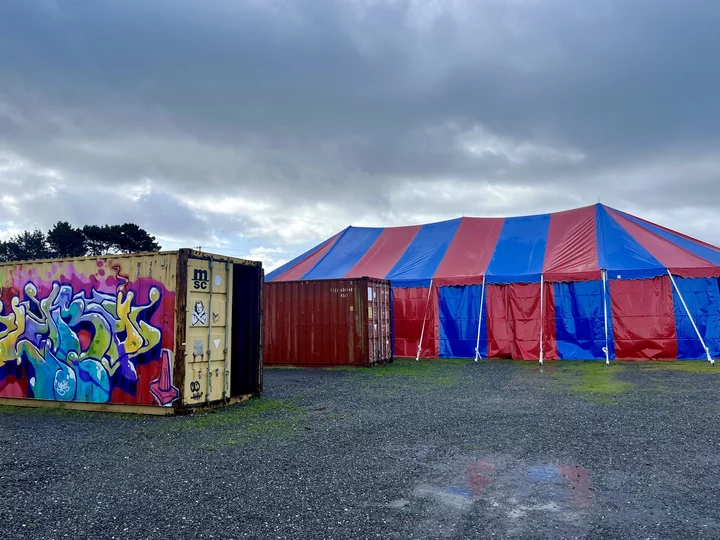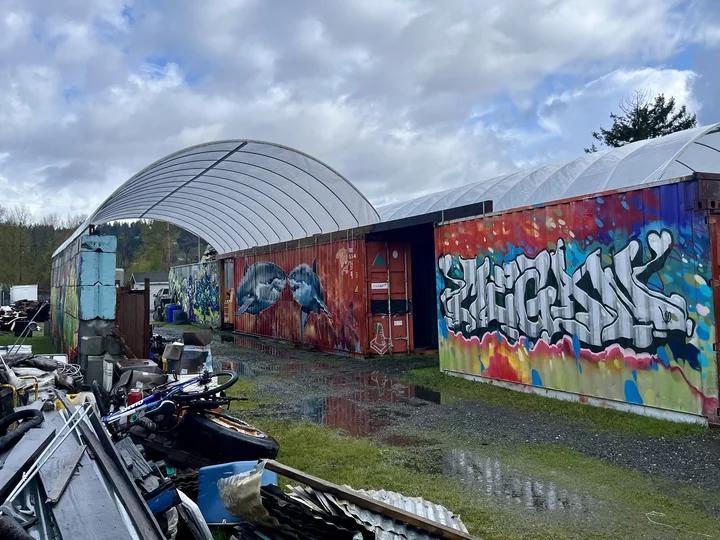The tent that will be used for art-making | Photos: Stephanie McGeary.
###
If you’ve driven down Giuntoli Lane in Arcata’s Valley West neighborhood recently, you may have noticed a big, red and blue circus tent peeking over the top of a fence on Carlson Park Drive. If you thought that the circus was coming to Valley West, sorry to say, that is not the case. The tent – which was set up a couple of weeks ago by the Arcata Playhouse/ Playhouse Arts – will actually be used as a space for unhoused people to make art out of the garbage from abandoned camps.
Jacqueline Dandeneau, executive artistic director for the Playhouse, told the Outpost that the project is an extension of Playhouse Art’s Our Space program, which offers free art classes to unhoused or housing insecure folks in our community. This specific project, which is collaboration between Playhouse Arts and the Northcoast Environmental Center (NEC), was funded by an Upstate California Creative Corps grant and aims to provide a creative outlet for houseless and housing insecure artists, while diverting trash from the wastestream into the artstream.
“The purpose of the grant is using artists to help address community issues,” Dandeneau said in a phone interview Thursday. “So we’re addressing homelessness and the environment, because the camps are environmental degradation.”
NEC has been helping with cleanups of homeless camps for about two years, and started working with the Our Space program about a year ago. Caroline Griffith, executive director of NEC, said that the partnership came about because NEC wanted to figure out a way to reuse some of the items being left behind at abandoned camps.
Griffith said that NEC was seeing a “troubling trend” of campers being shuffled around from place to place, which causes the litter to be more spread out. Also when people are forced to leave their camps, they often don’t have the resources – such as dumpsters, recycling cans or transportation to the dump – to adequately clean up their camps.
When Griffith went to check out Our Space – then located in a storefront on Ninth Street – she found a very welcoming environment, where people were having conversations, sharing food and making cool art. NEC thought that providing the artists with reusable items recovered during the cleanups would be a great way to support the program, while also diverting waste from the landfill. The two agencies started working together and have since collaborated on art/ environmental projects like the Craft for the Coast Trash Art Contest.
For the project in Valley West, Griffith said that it is still in the very early stages and NEC is currently setting up the system for bringing in and sorting materials and will soon start holding building sessions with unhoused people from the community that they have been working with through the Our Space program and through helping with the camp cleanups.
And the circus tent for art-building is not the only cool thing that’s happening on this little patch of property in Valley West. The site has been occupied for some time by Isaac Lyons and his business Humbuildt Homes – which has a warehouse on the north side of the site. After another tenant that was sharing the property left, Lyons decided to lease the entire parcel. But since he didn’t really need the entire space for his company, he decided to sublease to various nonprofit organizations.
Murals on the outside fences orchestrated by Julia Finkelstein
For about a year Zero Waste Humboldt has been renting a shipping container on the site for its Reuse Center – a thrift store for craft and construction materials, such as doors, windows, scrap metal, hardware and more. The store is open every fourth Saturday of the month between 10 a.m. and 4 p.m., and by appointment.
Cooperation Humboldt also plans to use the site to open a tool library – a place where folks who don’t have the money or space for their own tools can borrow them to work on a project – and Julia Finkelstein, a local artist and owner of Epitome Gallery in Eureka, has also been using the space to showcase street art and helped paint colorful murals along the outside fence and on the shipping containers inside.
Lyons said that his dream is to turn the site into a hub for sustainable development that houses multiple business and nonprofit organizations, offering classes and other community resources. Lyons said that his business is currently working on a line of modular, prefabricated homes that he hopes to be able to showcase on the site. Lyons said his team is also setting up classrooms in the warehouse so that they can offer classes on general carpentry and construction techniques, plumbing, solar installation and more. Eventually Lyons would like to create a pathway for community members to become a general contractor, something that he feels could address the shortage of licensed contractors, while also helping people who maybe can’t afford to hire contractors for their projects.
“Currently, with the number of tradesmen out there and general contractors – that’s part of the issue and challenge — there’s not enough of them to ever create enough housing for all the people who need it,” Lyons said in a recent phone interview. “And people who need [a home] often can’t afford to have it built for them. We need to teach people essentially how to fish.”
As far as when all of these services will be up and running and accessible to the public, it’s hard for Lyons to say. All of the various groups are still figuring out how everything can come together. But there are plans in the works to hold a couple of outdoor events on the site in the summer.
“We’re hoping there’ll be some synergy there between all of us and that we can create something that is fun and can be offered to the public,” Lyons said.
As for the Our Space program under the big tent, things are already underway and Griffith said that the volunteers are planning to build several sculptural pieces out of objects that they find a lot of at camp cleanups, such as bicycle parts and tent parts. Griffith didn’t want to give too much away about the sculptures, but said that they will likely be mobile in some way and that the group plans to bring them to some public events in the late summer/ fall.
The Playhouse and NEC are only committed to keep the tent at the site until November 15, at which point the tent will be coming down to protect it from the elements. That’s also when the grant funding for the project dries up. But if the project is successful, Dandeneau and Griffith said it is likely that they’ll pursue additional funding to keep the space running and help transform the property into a thriving community center for Valley West an area that has been historically underserved.
When asked why the Our Space project was important for our community – particularly the unhoused or low income folks in Valley West – Dandeneau and Griffith said that programs like this are not only a great way to help keep waste out of the landfill, but also help those contributing to the project to feel productive and even empowered.
Though they understand that helping unhoused people make art is not going to solve the issue of homelessness, they feel that it can be a part of a multifaceted approach to improving the lives of those who are struggling to survive.
“I’m a big believer in creative placemaking and that the arts are a vibrant part of mental health, community health, individual health, social health, and that the arts really are a place where people can express themselves and people can feel pride of place,” Dandeneau said. “We’ve kind of gone on this linear wellness train, thinking that if we give someone a job and a roof over their head, that they’re fine. And we all know that that’s not the truth.”



CLICK TO MANAGE